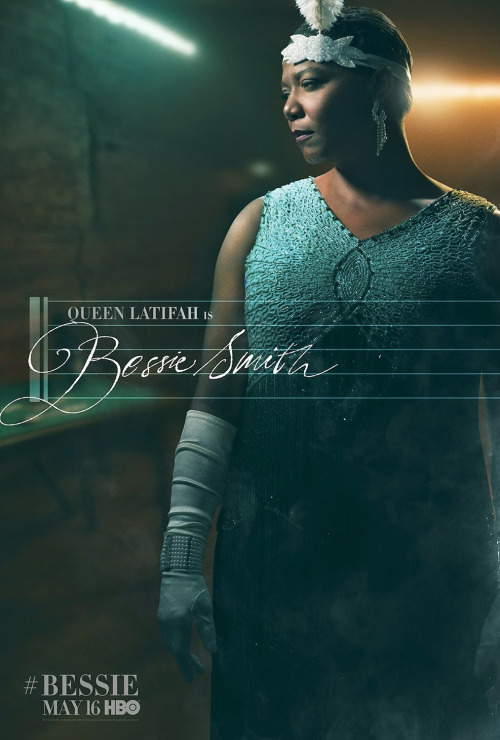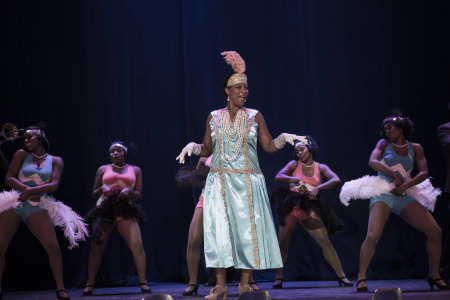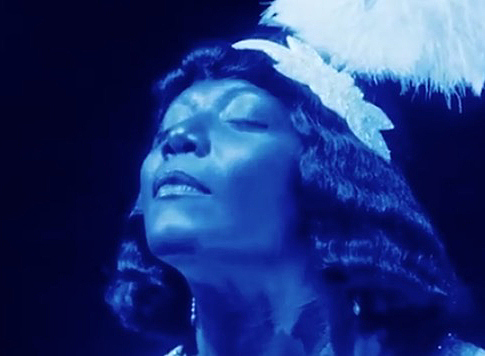 Considering how often Pariah is called "a critical darling," it's disappointingly shocking that it took another 4 years for Dee Rees's next movie. Bessie is an HBO biopic of singer Bessie Smith, the Empress of the Blues, who rose to prominence in the 1920s and died in a car accident in the mid-1930s. When the movie premiered earlier this year, Angelica Jade Bastién wrote a fabulous personal review of it which I highly suggest you read. As Angelica points out, Rees's sophomore effort is a well-directed film that gets a lot right, even though it falls into a lot of the typical biopic pitfalls.
Considering how often Pariah is called "a critical darling," it's disappointingly shocking that it took another 4 years for Dee Rees's next movie. Bessie is an HBO biopic of singer Bessie Smith, the Empress of the Blues, who rose to prominence in the 1920s and died in a car accident in the mid-1930s. When the movie premiered earlier this year, Angelica Jade Bastién wrote a fabulous personal review of it which I highly suggest you read. As Angelica points out, Rees's sophomore effort is a well-directed film that gets a lot right, even though it falls into a lot of the typical biopic pitfalls.
While the plotline of Bessie's meteoric rise, humbling fall, and return to semi-greatness followed a predictable biopic path, what really struck me about this collaboration between Dee Rees and Queen Latifah was how unapologetically individual it was. Unfortunately, fact-based films about black characters, if they are expected to attract a wider (whiter) audience, incorporate white characters to a large degree. Selma and 12 Years A Slave both have white antagonists who gain a lot of screentime - in the case of 12 Years A Slave, it was enough screentime to net Michael Fassbender an Academy Award Nominations.
In Bessie, blackness and queerness dominate...

Between fantastic musical numbers by Queen Latifah in top form, white characters pop up occasionally to attempt to profit from or prostheletize about Bessie Smith (Latifah). But otherwise everyone, from the crowd Bessie sings with to the people she does business with, is black. Questions of blackness are constantly addressed in the film. After Bessie is fired from a job for failing the "paper bag test" - her skin is darker than a paper bag - she institutes her own paper bag test and refuses to hire any "yellow bitches." It's a backlash, but a powerful one, and speaks powerfully to the confrontational way that Bessie Smith - and Dee Rees - presents her blackness in a whitewashed world. Questions of race are continuously brought up during the movie, though the biopic is forced to move with such fast speed that often moments such as the paper bag test are left hanging.
Equally controversial and confrontational is Bessie's sexuality. What makes the film so confrontational is how normally it portrays queer women of color. Early in the film, Bessie meets Ma Rainey, played with thorough self-satisfaction by Mo'nique. Ma Rainey sleeps with women, and does a cabaret act in drag, and other than a quick tossed off line, neither is addressed as either bad or unusual. Likewise, Bessie's affair with Lucille is presented as heartfelt and sweet. But the thing is, this is unusual, not just for 1920s America, but also for 2015 American television. Count all of the queer women of color on TV you can think of right now. I'd be shocked if counted past one hand.
 Ultimately, this is the contradiction of Dee Rees's film: Its biopic structure is completely quotidian, but its subject matter is exactly the opposite. It's so close to being exceptional. Rees continues to prove that she understands camera placement even with a new Director of Photography. Likewise, she pulls an incredible performance from Queen Latifah. But ultimately, that's not enough. It's possible that we may have to wait another 4 years for a film or series from the director. Rees says that she has some projects lined up. Let's all pray to the ghost of Bessie Smith that they come to fruition.
Ultimately, this is the contradiction of Dee Rees's film: Its biopic structure is completely quotidian, but its subject matter is exactly the opposite. It's so close to being exceptional. Rees continues to prove that she understands camera placement even with a new Director of Photography. Likewise, she pulls an incredible performance from Queen Latifah. But ultimately, that's not enough. It's possible that we may have to wait another 4 years for a film or series from the director. Rees says that she has some projects lined up. Let's all pray to the ghost of Bessie Smith that they come to fruition.

12/17: Water Lillies - Celine Sciamma's first film was an exploration of young love in a summer camp. (Netflix)
12/24: Tomboy - Sciamma's second takes on the sensitive subject of trans identity in childhood. (Amazon Prime)
12/31: Girlhood - Sciamma's latest looks at the relationships girls develop with each other in a contemporary girl's gang. (Amazon Prime)